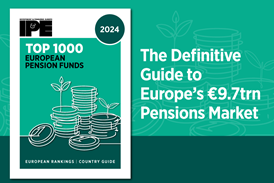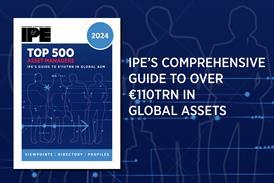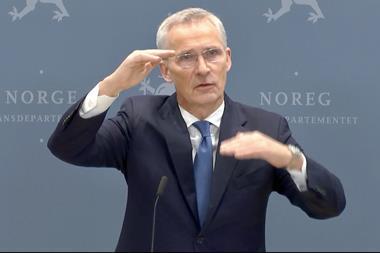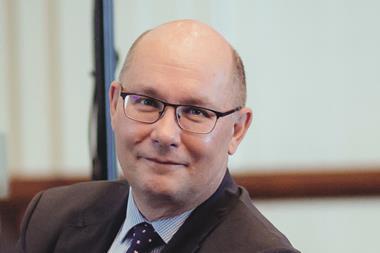Local Government Pension Scheme (LGPS) investment pools in England and Wales have pushed back against proposals by the UK’s chancellor of the exchequer Rachel Reeves to create “megafunds”, arguing other models deliver better value for money.
In her first Mansion House speech in November, Reeves announced a number of different measures in what she dubbed the biggest pensions reform in decades.
One of the government’s proposed key measures is changes to LGPS funds in England and Wales, which oversee £390bn (€464bn) across 86 schemes, covering six million individual members.
A key proposed plan is the merger of the existing eight investment pools into a handful of ‘megafunds’ authorised by the Financial Conduct Authority (FCA), which the government believes will allow them to invest more in assets such as infrastructure.
Each administering authority will be required to specify a target for a pool’s investment in their local economy, working in partnership with local and mayoral combined authorities to identify opportunities that would support local growth.
The government’s proposal also stated that if each administering authority were to set a 5% investment target, that would secure a notional £20bn of investment in local communities.
A new independent review process will be established to ensure each of the 86 administering authorities is fit for purpose, the government noted.
However, in response to the government’s pension review consultation, the investment pools expressed they want to meet the government’s pooling requirements without merging.
ACCESS
ACCESS, which has £52bn of its assets pooled (or 77% of assets across its 11 members, as of January 2025) has said in its response that it undertook a “detailed evidence-led exploration” of all options “from creating a build model, regulated by the FCA, by setting up a new investment company; to seeking detailed responses to an extensive questionnaire from other pools on possible mergers”.
It has concluded that converting its current collaboration into an FCA-regulated model was most appropriate for ACCESS. This option, it said, continues the development of ACCESS as an investment pool and enables it to build on the strong foundation it has already created.
It added that the proposal on this basis avoids the complexities of merging with others and creating pools with an even greater number of partner funds, maintaining ACCESS’s “best in market” investment management approach.
Crucially, it added, this would be the least expensive option to meet the government’s criteria. It said that even after the costs of its scheduled sub-fund review, it avoids the highest transaction costs.
It said: “Merging with an established pool, for example, could cost nearly double the ACCESS build option in one-off expenses, amounting to multiple tens of millions of pounds.”
Mark Kemp-Gee, chair of the ACCESS joint committee, said: “We have thoroughly explored all options available to meet the government’s priorities best. There is no doubt that converting ACCESS to a build model, and setting up a new investment company as the basis of continuing the ACCESS journey, is by far the best option.”
He continued: “This approach works culturally and is easily the most financially prudent and least expensive option. It also delivers additional benefits such as capacity to assess and manage local investment opportunities.”
Kemp-Gee added that the timeline set by the UK government is “challenging” but he is convinced the change to an FCA-regulated build model is achievable in the timeframe.
Other pools
Similarly, Wales Pension Partnership (WPP) said it is developing plans to continue as a standalone pool and is committed to seeking FCA authorisation.
Border to Coast Pensions Partnership, Brunel Pension Partnership, LGPS Central, and London CIV have also supported the proposal to establish FCA-regulated investment companies.
Northern LGPS, meanwhile, has pushed back even more, saying that it does not think that FCA authorisation is “an indispensable requirement” to having expertise and capacity to implement investment strategies effectively for a small number of large LGPS funds.
It cited the success of the Northern LGPS to date in internal investment across private and listed asset classes at low-cost as a reason why FCA regulation is not needed.
However, it accepted that the model would not work for a larger group of funds or smaller funds without significant internal resources.
The LGPS pools of England & Wales and their business models
| Model (Ownership, capability, services) | Number of partner funds | Total AUM (incl. cash) (£bn) | Assets invested in pooled vehicles (£bn/%)* | Total assets managed by pool (£bn/%) | Number of pooled sub-funds | |
|---|---|---|---|---|---|---|
| ACCESS | Joint committee management; Fully outsourced investment management provider | 11 | 64.6 | 32.7 (51%) | 44.7 (69%) | 30 |
| Border to Coast | Partner/shareholder; FCA regulated; Internal management; Developing advisory | 11 | 63.7 | 37 (58%) | 45.3 (71%) | 17 |
| Brunel | Partner/shareholder; FCA regulated; External management only | 10 | 40.3 | 32.2 (80%) | 34.7 (86%) | 27 |
| LGPS Central | Partner/shareholder; FCA regulated; Internal management; Developing advisory | 8 | 61.4 | 19.7 (32%) | 27.5 (45%) | 26 |
| Local Pensions Partnership (LPP) | Partner/shareholder; Advisory; FCA regulated; Internal management | 3 | 23 | 21.9 (95%) | 23 (100%) | 10 |
| London CIV | Partner/shareholder; FCA regulated; External management only; Developing advisory | 32 | 50.8 | 17.2 (34%) | 31.6 (62%) | 24 |
| Northern LGPS | Joint committee management;Two pooled investment vehicles – GLIL infrastructure and NPEP private equity | 3 | 61.4 | 3.7 (6%) | 59 (96%) | 2 |
| Wales | Joint committee management; Fully outsourced investment management provider | 8 | 25 | 13.3 (53%) | 18.5 (74%) | 10 |
| Source: Ministry of Housing, Communities and Local Government | ||||||
| *Assets invested in pooled vehicles reflects those assets that are managed via the pool’s sub-funds, which are shared investment vehicles across the partner LGPS funds. | ||||||
Read the digital edition of IPE’s latest magazine























No comments yet